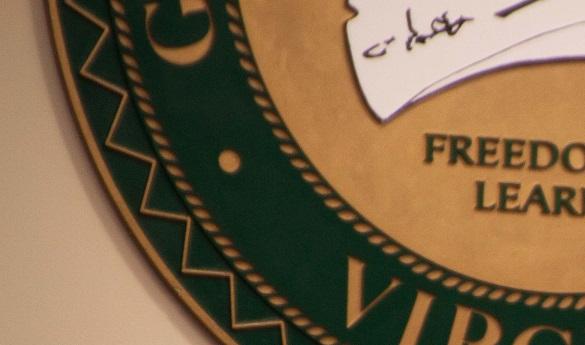Provost candidate David Wu delivers presentation to Mason community
In a presentation to administration and faculty, David Wu, a finalist in Mason’s Provost search, highlighted the need for universities to be responsive to trends in higher education. Out of 70 applicants, Wu, dean of the Rossin College of Engineering and Applied Science at Lehigh University, was chosen by the provost search committee as one of the four finalists for the position.
“What really impressed me was the enthusiasm of the faculty and staff,” said Wu as he introduced himself to the crowd of Mason administration and faculty. “When I started my research, the first thing I read was your strategic plan. It’s one of the best I’ve ever read. I particularly liked the phrase ‘best university for the world’. It’s a good fit for the way I see things.”
Wu has been dean of the college for the past 10 years. Trained as a system’s engineer, Wu has experience dealing with large scale, complex systems. Wu also credited being a good listener as vital to addressing problems in higher education.
“A good listener doesn’t just take everything in,” Wu said, “but does something about it.”
Wu used the example of a professor who approached him at Lehigh about a village in Honduras that had been devastated by a hurricane. As dean, Wu contacted a student club called Engineers without Borders and eventually got a water supply system for the town. There were problems with distributing the supply and dealing with political factions, so the group recruited students from other majors. Cross-department projects became one of the main talking points of the conference.
“I really think that the role of provost is a bridge… Think about different colleges and departments within a university. They can seem like different countries, but the job of the provost is to find that common ground,” Wu said. “The strategic plan isn’t a plan, it’s a communication tool. We say ‘this is what we want to be when we grow up’ and that helps us say ‘this is where we’re going’. A bridge can help us get there.”
According to Wu, another way to address higher education problems is to build academic ventures.
“The idea is to have an understanding of the field to identify a niche we can impact,” Wu said, adding that 22 percent of the nation’s population is reaching “elderly” but that hospitals are not equipped to handle it. “The solution is secondary care facilities and home care, which is already very popular in Europe. What is needed is the technology infrastructure to make that happen.
There’s a need for portable, ubiquities medical technology, so we identified portable medical devices as our niche.”
Wu also highlighted his experience in dealing with raising money for the school.
“In a private university, if we want to do something,” Wu said, “we need to raise every single dollar for that to happen.”
As part of the strategic plan, research has been made a core component of the university’s academic programs. Administrators hope to raise about $180 million in research funding over the next few years.
In Wu’s experience, putting resources into research and funding have often been rewarding.
“I see a large number of institutions in a multi-discipline setting, so how do you go from excellent to distinctive,” Wu said. “Distinctive is really making an impact on the world; by having research with consequence.”
Like the other candidates, Wu followed his presentation with questions from the gathered faculty and staff. A series of questions addressed Mason’s increasing focus on becoming a more global university. With the debut of Mason’s Korean campus and the university’s mixed results with global campuses in the past, Wu was asked about his vision for running a successful international school.
“Go in with eyes wide open,” Wu said. “The experience is always mixed. When you go to a table of collaboration, you need to be very clear what you want out of that relationship. Talk to the right people, do your homework, and look from a strategic perspective at what you want from that relationship.”
“How does international outreach and international ventures strengthen the university?” asked Anne Schiller, vice president for Global Strategies and a professor of Anthropology. Wu pulled on his experience with global education as a dean.
“If there are additional connections, especially for programs that aren’t usually international, we have a process for faculty to write up a proposal for a global aspect,” Wu said. “We had some very good programs for student activities. Faculty took students to Italy to study architecture, many go to developing countries.”
As he finished his response, Wu connected the answer to one of his earlier topics of addressing trends in global education, “I think many of them fall into those natural projects that can develop in unexpected ways.”

